ソ連兵は何を信じ、なぜ戦い続けたのか~「独ソ戦に学ぶ」記事一覧
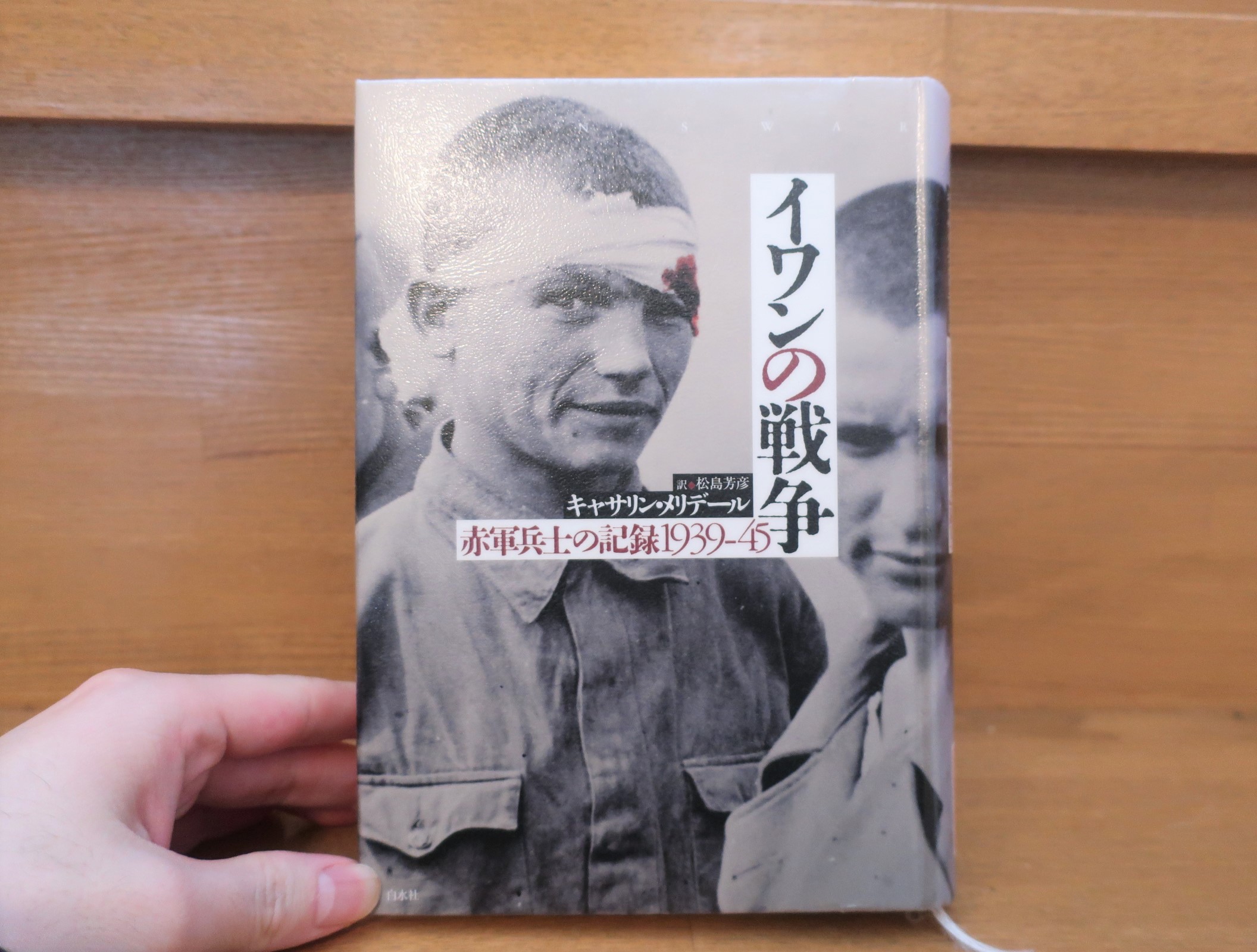
「『イワンの戦争 赤軍兵士の記録1939-45』を読む」記事一覧
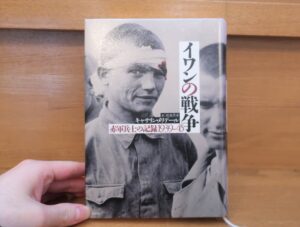
キャサリン・メリデール著、松島芳彦訳『イワンの戦争 赤軍兵士の記録1939-45』は白水社より2012年に発行されました。キャサリン・メリデールは以前当ブログでも紹介した『クレムリン 赤い城壁の歴史』の著者でもあります。

この本もものすごく刺激的で面白く、私は『イワンの戦争 赤軍兵士の記録1939-45』を読む前からキャサリン・メリデールの書いた本ということでものすごく期待していました。そして実際、期待以上に面白い本でした。これはものすごい本です。
この本は、私が独ソ戦の歴史を学び始めてからずっと疑問に思っていたことに答えてくれた本でした。
その疑問とは、「なぜソ連の兵士は死ぬとわかっていても戦い続けたのか」という疑問でした。
独ソ戦においてソ連は人海戦術と言えば聞こえがいいですが、信じられないほど大量の兵士をナチス軍に突撃させています。そして無残にも彼らは圧倒的な戦力差で蹂躙されたのでありました。
しかしこの人海戦術は結果としてナチス軍を撃退することになります。
スターリンの命令により兵士として戦闘を強制されたことはわかります。逃げたり捕虜となってしまえば身内共々殺すという規則が兵士を動かしていたこともこれまで学んできました。(以下の記事を参照下さい)
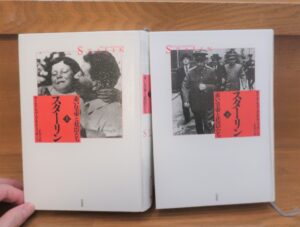
しかしそれでもなお彼らがなぜあそこまで悲惨な戦いを続けられたのかということが私にはどうしてもわからなかったのです。
そのことをこの本では当時の戦争経験者への聞き取りやソ連崩壊に伴う新資料を駆使して分析していきます。
この本では一人一人の兵士がどんな状況に置かれ、なぜ戦い続けたかが明らかにされます。
彼ら一人一人は私たちと変わらぬ普通の人間です。
しかし彼らが育った環境、ソ連のプロパガンダ、ナチスの侵略、悲惨を極めた暴力の現場、やらねばやられてしまう、戦争という極限状況が彼らを動かしていました。
人は何にでもなりうる可能性がある。置かれた状況によっては人はいとも簡単に残虐な行為をすることができる。自分が善人だと思っていても、何をしでかすかわからない。そのことをこの本で考えさせられます。
それぞれの記事でより詳しくお話ししていますので、興味のある方はぜひご参照ください。
なぜ独ソ戦で異常なほど大量の犠牲者が出たのか~絶滅戦争・イデオロギーの戦い『イワンの戦争 赤軍兵士の記録1939-45』を読む⑴

- 1 キャサリン・メリデール『イワンの戦争 赤軍兵士の記録1939-45』を読む⑴ 目次
- 1.1 独ソ戦―想像を絶する闘い
1.2 なぜ独ソ戦で異常なほど大量の犠牲者が出たのか~絶滅戦争・イデオロギーの戦い
1.3 タイトル『イワンの戦争』の意味
1.4 ソ連が公式に認めていた唯一の物語―理想的な兵士像
1.5 沈黙が語ること
- 1.1 独ソ戦―想像を絶する闘い
独ソ戦の独特なところは、この戦争が絶滅戦争であり、イデオロギーの戦いだったところにあります。もちろん領土問題や経済利権のために戦ったのでもありますが、戦争を戦う兵士たちを動かすために指導部が利用したのは「自分たちは正義であり、敵は人間以下の最低な奴らだ。敵を絶滅しなければならない」という思想だったのです。
そしてソ連は人海戦術を取りドイツ軍に向かって行きました。倒しても倒してもどんどんやって来るソ連兵にドイツ軍もついには負けてしまったのです。
なぜ独ソ戦で異常なほど大量の犠牲者が出たのか~絶滅戦争・イデオロギーの戦い『イワンの戦争 赤軍兵士の記録1939-45』を読む⑴
立派なソ連人を生み出すプロパガンダ教育ーオーウェルの『1984年』の世界『イワンの戦争 赤軍兵士の記録1939-45』を読む⑵

- 1 キャサリン・メリデール『イワンの戦争 赤軍兵士の記録1939-45』を読む⑵
- 1.1 ソ連のプロパガンダ映画
1.2 立派なソ連人を生み出すソ連の学校教育
1.3 理想に燃えるソ連の若者たち
1.4 生きるためには自分を変えねばならない
- 1.1 ソ連のプロパガンダ映画
ソ連のプロパガンダ教育は若い世代に確実に浸透していました。「二十年に及ぶ学校教育とプロパガンダが効果を発揮していた」という言葉がこの記事内で語られます。不気味な言葉ですよね。教育やプロパガンダはそれだけ長い期間を用いて人々の世界観に多大な影響をもたらします。その教育を受けた人間とそうではない人間ではそもそも世界の見え方が違うのです。これは非常に重要な点です。
夢、希望、進歩、改善、英雄、理想・・・などなど。
耳触りのいいこうした言葉ほど人を、特に若い世代を動かすものはありません。
その言葉の示す本当の意味を知らぬまま、知らず知らずの内に若者たちの精神はソ連の兵士になっていくのです。
立派なソ連人を生み出すプロパガンダ教育ーオーヴェルの『1984年』の世界『イワンの戦争 赤軍兵士の記録1939-45』を読む⑵
ソ連の人海戦術と決死の突撃ー戦場における「ウラー!」という叫び声とは『イワンの戦争 赤軍兵士の記録1939-45』を読む⑶

- 1 キャサリン・メリデール『イワンの戦争 赤軍兵士の記録1939-45』を読む⑶
- 1.1 独ソ戦の開始
1.2 人海戦術の突撃と「ウラー!」という叫び声
1.3 悪名高い命令第二二七号―「一歩も引くな!死ぬまで戦え!」
1.4 命令第二二七号が兵士に与えた影響
1.5 生身の人間としての兵士たち
1.6 戦闘によって束縛から解放される
- 1.1 独ソ戦の開始
「ウラー!」という言葉はソ連兵がよく口にした叫び声でした。
Goo辞書では「突撃のときに、または歓喜を表して発する語。万歳。」という意味として書かれていました。
Youtubeに何の映画かはわかりませんが、おそらく独ソ戦の戦闘と思われるシーンでまさしく「ウラー!」の叫び声と共に突撃する映像がありましたのでこちらに引用します。かなりショッキングな映像なのでご注意ください。
冒頭の突撃シーンから寒気がしました。これは迎え撃つドイツ兵もとてつもない恐怖だったと思います。
殺しても殺しても次から次へ死を恐れずに突撃してくる。これほどの恐怖はありません。
そして無謀な突撃は案の定壊滅的な被害を出しソ連兵は撤退するのですが、驚くべきことに、撤退する兵士を今度はソ連司令部が殺戮するのです。
ソ連軍において撤退は許されません。この後で紹介しますが、死ぬまで戦えという指令が鉄の掟として存在していたのです。だから撤退して戻ってきた兵士を軍規違反として殺すのです。
ソ連兵はナチス兵に蹂躙され、逃げれば今度はソ連軍にも殺されるのです。
こうして最前線に立たされる無数の兵士の死体が累々と積み重ねられていったのです。「ウラー!」の叫びと共に人海戦術が行われていたのでありました。
恐怖の人海戦術と決死の突撃ー戦場における「ウラー!」という叫び声とは『イワンの戦争 赤軍兵士の記録1939-45』を読む⑶
スターリンによる戦争神話の創造と歴史管理~現実を覆い隠す英雄物語『イワンの戦争 赤軍兵士の記録1939-45』を読む⑷

- 1 キャサリン・メリデール『イワンの戦争 赤軍兵士の記録1939-45』を読む⑷
- 1.1 スターリンによる戦争神話の創造
1.2 兵士の精神疾患
1.3 ドイツに進軍するソ連兵の蛮行
- 1.1 スターリンによる戦争神話の創造
1943年になるとソ連がついに優勢に立ちます。ここから政治家たちはさらに国民の士気を高めるために戦争神話を作り出していきます。
ソヴィエト政府にとって都合のいいように事実は解釈され神話は作られていきました。それに合致しないものはすべて黙殺されていったのです。
そしてそうした歴史管理は戦後もずっと続くことになります。
スターリンによる戦争神話の創造と歴史管理~現実を覆い隠す英雄物語『イワンの戦争 赤軍兵士の記録1939-45』を読む⑷
兵士たちは犠牲者を人間とみなさなかったー兵士の心理と性暴力の悲劇『イワンの戦争 赤軍兵士の記録1939-45』を読む⑸

- 1 キャサリン・メリデール『イワンの戦争 赤軍兵士の記録1939-45』を読む⑸
- 1.1 兵士たちは犠牲者を人間とみなさなかった
1.2 ソ連兵の性暴力
1.3 兵士の心理と性暴力の悲劇
1.4 戦後も続くイワン伝説
- 1.1 兵士たちは犠牲者を人間とみなさなかった
それまでドイツ軍の猛攻にさらされ、尋常ならざる犠牲を出したソ連でしたが、スターリングラードの戦いから形勢が逆転し反転攻勢に出ます。
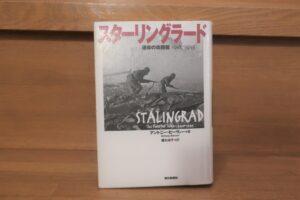
彼らが目指すはヒトラーの本拠地ベルリン。ソ連兵たちはその行く先々で暴虐の限りを尽くしました。
たしかに侵攻してきたナチスの残虐行為は悲惨なものでした。それに対し目には目をとばかりにソ連兵は侵攻した先々で略奪、殺人、レイプを繰り返したのです。
ソ連のプロパガンダによる兵士像は自分たちの残虐行為を免責する隠れ蓑にもなりました。
そしてそれは戦争が終わり復員した後も根強く存在し続けました。
ソ連が崩壊したことで今となってはこうした悲惨な事実が明るみに出てくるようになってきましたが、もしそうでなかったら今もなおそうした事実は知られることはなかったかもしれません。
兵士たちは犠牲者を人間とみなさなかったー兵士の心理と性暴力の悲劇『イワンの戦争 赤軍兵士の記録1939-45』を読む⑸
まとめ~なぜイワンは戦ったのか。兵士の内面を学ぶ意味『イワンの戦争 赤軍兵士の記録1939-45』を読む⑹

- 1 キャサリン・メリデール『イワンの戦争 赤軍兵士の記録1939-45』を読む⑹
- 1.1 この本の特徴と魅力ー訳者あとがきより
1.2 多種多様なイワンとソ連のプロパガンダ
1.3 前線における兵士の価値観
1.4 赤軍の暴虐と言葉にならない涙
1.5 イワンと日本ー私たちと決して無関係ではない独ソ戦
1.6 おわりに
- 1.1 この本の特徴と魅力ー訳者あとがきより
『「近代で最も苛烈な体制の犠牲者」だったイワンがなぜ、その体制のために命を賭して戦ったのか。「ロシアを救ったものの正体」は何か。勝利の報酬が幻滅と知った時、兵士は現実とどのように折り合ったのか―。』
名もなきイワンたちこそ体制の犠牲者であったにも関わらず、体制のために彼らは命を賭して戦った。この謎に迫るのがこの本の特徴であり、最大の魅力であります。
この本に書かれた内容は本当にショッキングです。目を反らしたくなるような蛮行が語られます。
ですがそんな地獄のような世界を生きたイワンたちも涙を流していました。
イワンたちの犯した悪行は許されるものではありません。しかしそれをただ弾劾するだけでは何も解決しません。
なぜそのようなことが起こったのか、そしてイワンたちは何に苦しみ、涙を流したのか。このことを突き詰めていくことこそ、同じ歴史をくり返さないためにも重要であると私は感じました。
まとめ~なぜイワンは戦ったのか。兵士の内面を学ぶ意味『イワンの戦争 赤軍兵士の記録1939-45』を読む⑹
おわりに
全6回にわたり「『イワンの戦争 赤軍兵士の記録1939-45』を読む」シリーズを続けて参りました。
紹介しきれなかった内容も多々あります。このブログで紹介したよりもさらに生々しい悲惨な記述がこの本ではたくさん出てきます。
この本を読んで戦争とは人をこんなにも変えてしまうのかと戦慄しました。
この本も非常におすすめしたい作品です。ものすごい本です。今のこうした世界だからこそ重要な一冊であると思います。
以上、「ソ連兵は何を信じ、なぜ戦い続けたのか「独ソ戦に学ぶ」記事一覧」でした。
Amazon商品ページはこちら↓
関連記事
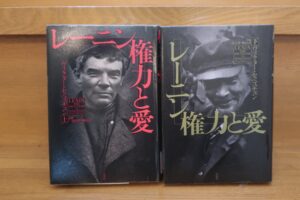


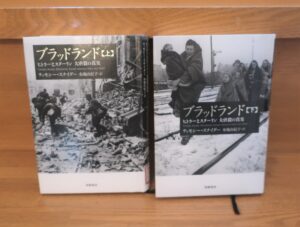

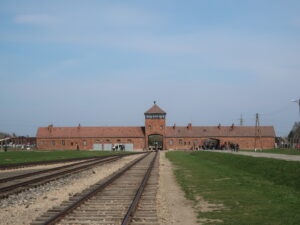

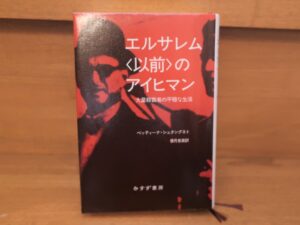
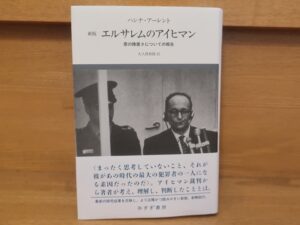
コメント